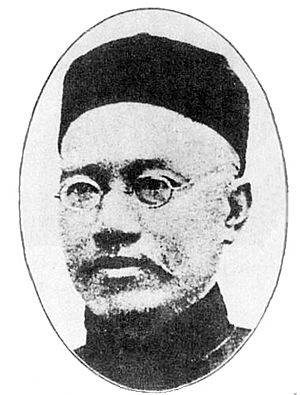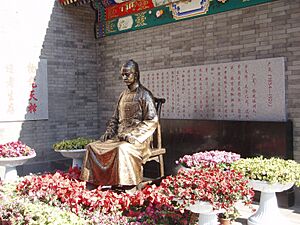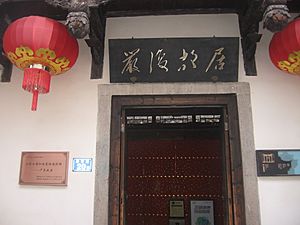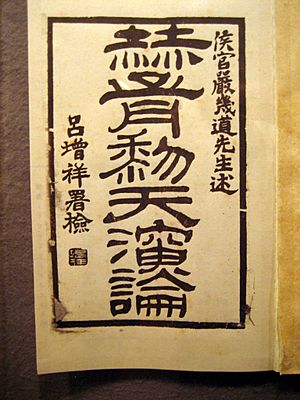Yan Fu facts for kids
Quick facts for kids
Yan Fu
|
|
|---|---|
 |
|
| President of National Peking University | |
| In office 3 May 1912 – 1 October 1912 |
|
| Preceded by | Lao Naixuan (as President of the Imperial University of Peking) |
| Succeeded by | Zhang Shizhao |
| President of Fudan University | |
| In office 1906–1907 |
|
| Preceded by | Ma Xiangbo |
| Succeeded by | Xia Jingguan |
| Personal details | |
| Born |
Yan Chuanchu (嚴傳初)
8 January 1854 Yangqi Village, Houguan county (now Fuzhou), Fujian, Qing China |
| Died | 27 October 1921 (aged 67) Langguan Alley, Houguan county, Fujian, Republican China |
| Alma mater | Royal Naval College, Greenwich |
| Occupation | Military officer, newspaper editor, translator, writer |
Yan Fu (simplified Chinese: 严复; traditional Chinese: 嚴復; pinyin: Yán Fù; Wade–Giles: Yen² Fu⁴, IPA: [i̯ɛ̌n.fû]; courtesy name: Ji Dao, 幾道; 8 January 1854 — 27 October 1921) was a Chinese military officer, newspaper editor, translator, and writer. He is most famous for bringing important Western ideas to China in the late 1800s. These ideas included Darwin's theory of "natural selection".
Contents
Yan Fu's Early Life and Education
Yan Fu was born on January 8, 1854, in what is now Fuzhou, Fujian Province. His family was well-respected and worked in Chinese medicine. His father wanted him to get a good education and prepare for the Imperial examination.
However, his father died in 1866, which changed his plans. A year later, Yan Fu joined the Foochow Arsenal Academy in Fuzhou. This was a Western-style school. He studied many subjects there, like English, math, physics, and navigation. This school was a big turning point for him. It was his first time learning about Western science, which made him very excited about learning new things.
Studying Abroad in England
After graduating with high honors in 1871, Yan Fu spent five years at sea. He worked on training ships and battlecruisers. From 1877 to 1879, he studied at the Royal Naval College, Greenwich in England.
While in England, he met Guo Songtao, who was China's first ambassador. Even though they had different ages and positions, they became good friends. They often spent hours talking about how Chinese and Western ideas were similar and different.
Becoming a Famous Translator
When Yan Fu returned to China, he didn't immediately find the success he hoped for. He couldn't pass the Imperial Civil Service Examination. However, he found teaching jobs at the Foochow Arsenal Academy and later at the Beiyang Naval Officers' School in Tianjin.
Yan Fu became famous after China lost the First Sino-Japanese War (1894–95). This war was fought over control of Korea. He became well-known for his translations of important Western books.
Key Western Ideas Introduced to China
Yan Fu translated many famous books. These included:
- Thomas Huxley's Evolution and Ethics
- Adam Smith's The Wealth of Nations
- John Stuart Mill's On Liberty
- Herbert Spencer's Study of Sociology
Through Huxley's book, Yan Fu introduced the ideas of "natural selection" and "survival of the fittest" to Chinese readers. He famously translated "natural selection" into Chinese as tiānzé (天擇). Yan Fu also shared his own thoughts on these ideas.
Yan Fu's Public Life and Later Years
Yan Fu worked as an editor for the newspaper Guowen Bao. He also became active in politics. In 1895, he joined the Gongche Shangshu movement. This group was against the Treaty of Shimonoseki, which ended the First Sino-Japanese War.
In 1909, he received an honorary Jinshi degree. This was a high academic honor. In 1912, he became the first principal of National Peking University, which is now Peking University. Today, the university holds a special meeting each year to honor him.
Later in his life, Yan Fu became a supporter of the monarchy. He backed leaders like Yuan Shikai and Zhang Xun who wanted to bring back the emperor. He also helped start an organization called Chouanhui (籌安會), which supported restoring the monarchy. He disagreed with the "New Literature Revolutionaries" like Hu Shih.
On October 27, 1921, Yan Fu passed away at age 67. He had returned to his home in Fuzhou a year earlier to recover from his ongoing asthma.
Yan Fu's Ideas on Translation

Yan Fu wrote in the introduction to his translation of Evolution and Ethics (天演論) that "there are three difficulties in translation: faithfulness, expressiveness, and elegance" (譯事三難:信達雅).
- Faithfulness: The translation should be true to the original meaning.
- Expressiveness: The translation should be clear and easy to understand.
- Elegance: The translation should be well-written and sound good.
These ideas became very famous in China. Many people thought they were the perfect rules for any good translation. Some scholars believe these ideas came from a Scottish translation expert named Alexander Fraser Tytler.
Even though Yan Fu tried to make his translations faithful, expressive, and elegant, some people criticized them. They felt his writing style was old-fashioned and hard for younger people to understand. For example, Cai Yuanpei, a famous liberal from the May Fourth Movement, said in 1924 that Yan Fu's translations "seem to be old-fashioned and his literary style is difficult to comprehend." However, Cai Yuanpei still admired how Yan Fu chose and translated books.
Important Works Yan Fu Translated

Yan Fu was one of the most important scholars of his time. He helped bring Western social, economic, and political ideas to China. Before him, most translations focused on religion and technology. Yan Fu was also one of the first Chinese scholars to have lived in Western countries. Many earlier translators had studied in Japan and then translated Western works from Japanese into Chinese.
Yan Fu also helped create standard science words in China. He did this while working as the Head of the State Terminology Bureau.
In 1895, he published Zhibao (直報), a Chinese newspaper. It included some of his most famous essays:
- Lun shi bian zhi ji (論世變之亟) - About how fast the world was changing.
- Yuan qiang (原強) - About the source of strength.
- Pi Han (辟韓) - Arguing against Han Yu's ideas.
- Jiuwang jue lun (救亡決論) - About how to save the nation.
Later, from 1898 to 1909, Yan Fu translated these major Western books:
- Evolution and Ethics by Thomas Henry Huxley as Tianyan lun (天演論) (On Evolution) 1896-1898
- The Wealth of Nations by Adam Smith as Yuan fu (原富) (On Wealth) 1901
- The Study of Sociology by Herbert Spencer as Qunxue yiyan (群學肄言) (A Study of Sociology) 1903
- On Liberty by John Stuart Mill as Qunji quanjie lun (群己權界論) (On the Boundary between the Self and the Group) 1903
- A System of Logic by John Stuart Mill as Mule mingxue (穆勒名學) (Mill's Logic) 1903
- A History of Politics by Edward Jenks as Shehui tongquan (社會通詮) (A Full Account of Society) 1903
- The Spirit of the Laws by Montesquieu as Fayi (法意) (The Meaning of the Laws) 1904-1909
- Primer of Logic by William Stanley Jevons as Mingxue qianshuo (名學淺說) (An Outline of Logic) 1909
See also
 In Spanish: Yan Fu para niños
In Spanish: Yan Fu para niños
 | William L. Dawson |
 | W. E. B. Du Bois |
 | Harry Belafonte |


